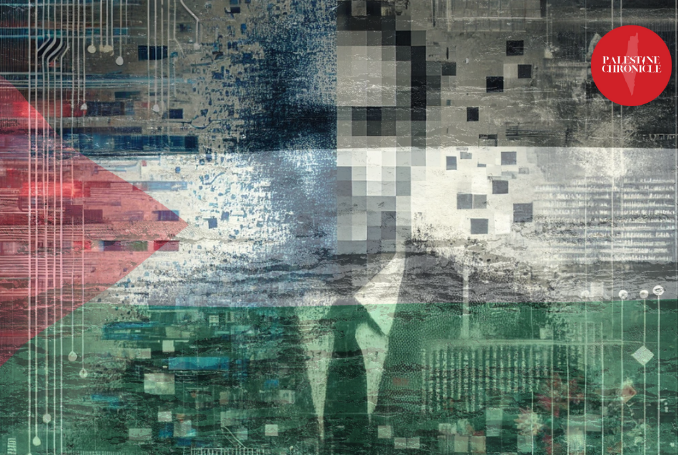
By Omar Zahzah
Tech companies’ complicity in erasing Palestinian voices online reflects a dangerous convergence of digital censorship and settler-colonial violence.
As journalists, writers, and critics at large, it’s important to be wary of the lures of the idealistic trap that suggests that writing about injustice—whether or not we are “exposing” it—will immediately and perceptibly counteract it. I don’t mean this as a cynical endorsement of the view that writing is “useless.” If nothing else, the view that counter-hegemonic critical expression is predestined to failure is in and of itself a tool of hegemony.
However, when a dominant socio-political regime can costume itself in the ideological armature of democracy, of populism, and even the so-called “alternative” in the very process of enacting measures that ensure structural subjugation, it’s vital to be wary of how even critical perspectives can be generally tolerated if not coopted, absorbed within an increasingly centralized neoliberal and corporate grammar of assurance that deflects the question of power.
This is precisely the case with Big Tech censorship of Palestine. Given its virtual omnipresence across all major platforms, social media suppression of Palestinians has unfortunately become so entrenched that its coverage has emerged as a particular beat of Palestine-focused journalism. The evidence of such censorship, painstakingly exposed in reports by motley rights groups as well as the innumerable Palestinians who individually decry account deletions, suspensions, and shadow-bans of their accounts, is so overwhelming that it is near impossible to generate a single timeline of repression. And yet, immunized by private corporate status, Big Tech companies are so impervious to the details of such exposes, however damning they may be, that they can patently deny the existence of actions that are heavily detailed and clearly playing out before our very eyes.
The preceding words from an anonymous Meta spokesperson in response to the latest report by the digital rights group 7amleh are a perfect encapsulation of the absurdity of this state of affairs, as well as a reflection of the unfortunately cyclical pattern of digital censorship of Palestinians has come to assume: after disproportionately targeting Palestinian users, the social media giant can falsely affirm only the latest detailed report by a digital advocacy organization by gesturing vaguely to “measures” and “policies” that “can impact” particular accounts, yet still deny, in lieu of the patent absurdity of such a claim, that “we deliberately suppress a particular voice.” This response conveniently elides agency and accountability, so that evident suppression becomes the unanticipated outgrowth of evenly applied processes.
Critical advocacy and analysis must assume a particular form under a status quo in which the products of companies have become so entrenched in socio-political convention and expression, and yet the private status of these companies mitigates direct accountability. For one thing, it is not enough simply to “expose” yet another transgression—though we certainly mustn’t cease documenting. Rather, we need to remain vigilant about how we categorize individual examples of targeted censorship. We need to refuse the symbolic elisions of corporate alibi and continue to center the broader, structural character of these companies’ actions.
It is well past time to recognize that tech companies such as Meta that routinize the censorship and erasure of Palestine-focused expression from their platforms are perpetuating a particular form of anti-Palestinian racism. In enforcing such targeted restrictions, these companies digitally reinforce the social and political Othering that Zionism inflicts upon Palestinians as a settler-colonial project defined by the elimination of the Indigenous population. Understanding it to be a distinct form of racialization emerging from the willing complicity of US-based tech companies, I refer to US Big Tech’s Zionist-aligned blackout on Palestinian expression as the process of “E-Racing Palestine.”
Settler-Colonial Coalescence
I use E-Racing Palestine rather than E-Racing Palestinians because it is not just the discriminatory censorship of individuals with which I am concerned, but also how this targeted repression coalesces with settler-colonial opposition to past, present, and future possibilities of interconnected Indigenous resistance and resilience. The Zionist state doesn’t merely target individual Palestinians—it seeks to destroy the very possibility of a cohesive anti-colonial Palestinian identity, history, and culture.
To that end, when tech companies willingly facilitate Israel’s desire for Palestinian censorship, they are also implicit in this broader process of Indigenous epistemicide, justified under the discriminatory notion that blanket targeting of particular groups of users is permissible under so-called “community standards” and even “terms of service.” In “walling off” Palestinians from the rest of the world through targeted restrictions, these companies are digitally fortifying the racial exclusion pithily expressed by Theodor Herzl’s expressed ambition for the Zionist project to render a colonial service to the West in keeping back the “uncivilized” Arab Indigenous population: “There [in Palestine] we shall be a sector of the wall of Europe against Asia, we shall serve as the outpost of civilization against barbarism.”
Zionism is a settler project cohered through European colonial and racial hierarchies of humanity and predicated upon the subsequent forcible removal of the Indigenous population. The very notion of a “land without a people for a people without a land” was never meant to be taken literally, as DecolonizePalestine notes, but ideologically:
A characteristic feature of early Zionist political discourse is pretending that Palestinians exist only as individuals or sometimes communities, but never as constituting a people or a nation. This was accompanied by the typical arrogance and condescension towards the natives seen in virtually every settler colonial movement.
That the early settlers interacted with the natives while simultaneously claiming the land was empty was not seen as contradictory to them. According to these colonists, even if some scattered, disorganized people did exist, they were not worthy of the land they inhabited. They were unable to transform the land into a modern functioning nation-state, extract resources efficiently and contribute to ‘civilization’ through the free market, unlike the settlers. Patrick Wolfe’s scholarship on Australia illustrates this dynamic and how it was exploited to establish the settler colony.
This becomes exceedingly clear when reading the discussions of early Zionists, such as Chaim Weizmann, who when asked about the inhabitants of Palestine responded with:
“The British told us that there are there some hundred thousands negroes (Kushim) and for those there is no value.”
In “Zionist Colonialism in Palestine” (1965,) Fayez Sayegh describes the subjection of the land and people of Palestine to Zionism as “an anomaly,” (v, emphasis in original,) given the fact that the very period that “witnessed the collapse of European Imperialism and the progressive elimination of Western colonialism from Asia and Africa” also realized the emergence of “a new offshoot of European imperialism and a new variety of racist colonialism” in Palestine, “the point-of-intersection of these two continents” (ibid.)
The global height of decolonization gave rise to new frameworks of self-determination and freedom from territorial encroachment that belied coeval status with a contemporaneous process of European settler-colonialism and internationally sanctioned dispossession of Indigenous peoples (Palestinian Arabs.) Sayegh defines Zionism as a settler-colonial ideology and project whose racial exclusivism was unique even for other European settler projects, given that Zionists’ expressed aims were ultimately incompatible even with hierarchical domination:
But the Zionist settlers could not countenance indefinite coexistence with the inhabitants of Palestine. For Palestine was fully populated by Arabs, whose national consciousness had already been awakened, and who had already begun to nurse aspirations of independence and national fulfillment. Zionist colonization could not possibly assume the physical proportions envisaged by Zionism while the Arab people of Palestine continued to inhabit its homeland; nor could the political aspirations of racial self-segregation and statehood be accomplished while the nationally-conscious Arab people of Palestine continued to exist in that country. Unlike European colonization elsewhere, therefore, Zionist colonization of Palestine was essentially incompatible with the continued existence of the “native population” in the coveted country. (4-5)
Zionism, Sayegh elaborates, presupposes a “racial identification” that “produces three corollaries: racial self-segregation, racial exclusiveness, and racial supremacy” (22, emphasis in original.)
Given their construction as developmentally inferior compared to European Jewish settlers, Palestinian expulsion and dispossession was naturalized in Zionist ideology and Western imperialist support for Israel. As such, direct acts of erasure that naturally emerge from institutionally sanctioned dehumanization of Palestinians are rarely perceived or discussed as contradictions by Western institutions that normalize the Zionist project and its colonial presence. There can be no denial of rights to those preemptively constructed as insufficiently human in a conceit that is normalized throughout the halls of power. This is no less true in digital than in physical sites. E-Racing Palestine is the ideal outcome of the electronic outgrowth of Western imperialist and Zionist hegemony, which I label digital/settler-colonialism.
Epistemological Implications
Scholarship on Big Tech often highlights the importance of understanding the epistemological implications of how current forms of tech interface with socio-political hierarchies. For example, in Race After Technology, Ruha Benjamin defines “The New Jim Code” as “the employment of new technologies that reflect and reproduce existing inequities but that are promoted and perceived as more objective and progressive than the discriminatory systems of a previous era.” (5-6, emphasis in original.) The fetishization of tech, like the fetishization of science, as a neutral arbiter or instrument in social life, as opposed to something conditioned by the contingent social structures of the contemporary moment, allows for the persistence of particular forms of socio-political deprivation under an ostensible (and false) banner of “neutrality.”
Technological progress is seen as interchangeable with social, historical, and political progress, and techno-determinism crowds out the very possibility of differential experience through the implicit inscription of a particular social subjectivity (say, the overly white and male world of Silicon Valley) as a platform for accessing universal humanity. But, as Benjamin notes, “the presumed blandness of White American culture is a crucial part of our national narrative. Scholars describe the power of this plainness as the invisible ‘center’ against which everything else is compared and as the ‘norm’ against which everyone else is measured. Invisibility, with regard to Whiteness, offers immunity. To be unmarked by race allows you to reap the benefits but escape responsibility for your role in an unjust system.” (4).
Ultimately, Benjamin encourages us not to think of race in relation to technology, but race itself as a technology, a “means to sort, organize and design a social structure,” (91), a view that will help us understand the strategic import as well as adaptability that patterns of racialization continue to exert for the state even as explicitly racist discourses and ideologies appear to have fallen by the wayside (as it turns out, the resurgence of white nationalism has rendered even this distinction incomplete at best.) All too often overloaded with associations of “neutrality,” new technologies are in fact direct outgrowths of the contingent socio-political conditions of a particular moment. Their fortification into powerful industries and interests thus often entails the embedding (rather than undoing) of the hierarchies underlying these technologies’ realization.
In the same way, we can understand how the hegemonic character of US Big Tech is an extension of the material and epistemological particularities of US structures and ideologies of radicalization, hetero cis-patriarchy and white supremacy, we must realize that its various fortifications of Israeli colonial and apartheid violence are not incidental transgressions of human rights. More fundamentally, they coalesce around and sanction the anti-Palestinian racism that galvanizes the Zionist settler-colonial imaginary. When prominent digital platforms routinize the mass censorship of Palestinians, they are not simply playing a double standard; they are digitally reifying the physical elimination of the Indigenous nation and people of Palestine.
Meanwhile, in the midst of a withering global reputation, Israel has pledged $150.00 million towards its “hasbara” (propaganda) efforts in 2025, which will include the utilization of social media as a tool of “consciousness warfare.” While physical and symbolic equivocation can run the risk of inadvertently undermining the tolls of the material violence of dispossession, it is difficult not to connect this attempted commandeering of digital pathways in the midst of coordinated censorship with the physical seizure and dispossession of Indigenous land to make way for the “civilized” colonial settlers whose presence is both preemptively and retroactively naturalized through shared ideological investments in settler-colonialism’s triumph.
Not Merely Ideological
Social media censorship frequently raises questions about political and ideological propriety. As Tarleton Gillespie notes, however, the notion of a censorship-free platform is fiction. Indeed, the digital platforms with which we have become increasingly familiar over the years as social media has standardized are defined by moderation, and how their staff sees fit to curate the ideal of a particular “community” best suited—and least threatening—to their brand (Custodians of the Internet 21.) At the same time, even as moderation is a pivotal feature of how tech companies define and maintain their platforms, it is the most opaque component of the platform maintenance process and the one that companies would like for the public to believe never happens, or happens far less frequently than it actually transpires, given how moderation decisions can often lead to social and political controversy (read: bad publicity.) Nevertheless, moderation is differentially applied. (7-8, and passim.)
US Tech companies’ cozy insulation from full accountability to the First Amendment, given their status as private companies whose products allegedly only serve as communicative mediums—a unique condition referred to as “safe harbor” under section 230 of US telecommunication law—gives them the legal leeway to effectively censor at will, even as these decisions run afoul of public trust and commitment to the principle of free speech (30-33.) It is also, arguably, rather outdated, given how contemporary digital platforms have no direct analog in preceding forms of communication, and how much they profit (both monetarily and in terms of cultural capital) from content willingly supplied by individual users (41,) not to mention how much of a social force-field prominent digital platforms have come to exert on quotidian life at a global scale. Big Tech companies want to have it both ways: they want for their platforms to continue to grow increasingly central to daily life and communication, but face minimal restrictions or consequences for undemocratic decisions and actions as these platforms only grow more inescapable.
Gillespie’s argument that platforms are defined by the process of moderation clarifies that what we are currently facing is not a sudden explosion of censorship so much as an increasingly publicized process of moderation, as prominent tech platforms, increasingly secure in their hegemonic hold on cultural life and expression, lean ever more comfortably into their largely undisputed authority to police users’ speech and expression. These are important and critical developments, and they have profound socio-political implications. But as Palestinian journalist Ramzy Baroud points out, the significance of these debates is not merely ideological when it comes to Palestinians currently facing genocide.
“While many are, rightly, outraged by the fact that this kind of widespread, and growing, censorship directly challenges the main tenets of democracy, the actual harm for Palestinians is much bigger,” Baroud writes.
Unlike most of us, Palestinians in Gaza use these platforms to communicate with one another, to know who is dead and who is alive, and to raise awareness of certain massacres, often taking place in isolation, especially in the northern Gaza strip… In the case of Gaza, the censorship takes a dark, deadly turn, as it could make the difference between people dying under the rubble of their homes or receiving assistance. Additionally, censorship of this magnitude often creates precedents and often leads to other forms of censorship that, in fact, are already taking place against other vulnerable communities, whether on a national scale or globally.
Baroud’s argument is worth engaging in depth. First, it reveals how social media censorship is not simply a question of ideological propriety (though it is certainly that.) As with other forms of Israeli colonial violence that preceded it, the Gaza genocide reveals how this censorship can very easily become a matter of life and death. When we recall scholar Ruth Wilson-Gilmore’s definition of racism as “the state-sanctioned or extra-legal production and exploitation of group-differentiated vulnerability to premature death” (Golden Gulag 28) it is not so difficult to realize how these companies’ willful facilitation of the Zionist settler state’s identity-based prohibition on digital expression is in fact a fortification of state-sanctioned racial violence. The fatal implications of E-Racing Palestine are all too clear, as these companies’ US-based legal insulation from accountability for discrimination does not mitigate their political and ethical culpability in digitally bolstering colonial racism and genocide.
Baroud’s deceptively simple observation that blanket forms of censorship such as the increasingly standardized censorship of Palestinians on social media “often creates precedents and often leads to other forms of censorship that… are already taking place against other vulnerable communities” reveals how E-Racing Palestine can work as a slow creep, creating facts on the ground via practices that are enacted time and time again until platforms see fit to expand them into-full-scale policies. E-Racing Palestine begins as a murmur and ends as a chorus of powerful interests consolidating their procedural support for settler-colonial designs.
This state of affairs is already damning, but it becomes even more so when we recall that the increasing normalization of oppression is also the modus operandi of the Zionist settler-colonial state. The current Gaza genocide is an escalation that was made possible by Israel’s increasing standardization of processes for inflicting as much massive, collective damage upon Palestinians in Gaza as possible.
Hindsight has revealed that Operation Cast Lead in 2008 established a precedent for large-scale assaults upon the Gaza strip whose regularity is reflected in the understated euphemism, “mowing the lawn.” Such indiscriminate, massive assaults upon a besieged colonized captive population grotesquely refine the militaristic prowess of the Zionist colonial state, as Gaza operates as a colonial laboratory for the colonizer to test-run military-grade weaponry, just as the West Bank is where the occupation forces are able to refine surveillance and crowd-control technologies. An increasingly hegemonic US Big Tech industry’s practice of E-Racing Palestine so as to reaffirm the Zionist colonial mandate reveals the stakes of expansive corporate imperial hegemony coalescing with the ever-escalating lethality of Zionist settler-colonialism—and the profound urgency of continued resistance.

– Omar Zahzah is a writer, poet, organizer, and Assistant Professor of Arab and Muslim Ethnicities and Diasporas (AMED) Studies at San Francisco State University. Omar’s book, Terms of Servitude: Zionism, Silicon Valley, and Digital/Settler-Colonialism in the Palestinian Liberation Struggle is forthcoming from The Censored Press in Fall 2025. He contributed this article to The Palestine Chronicle.









Be the first to comment